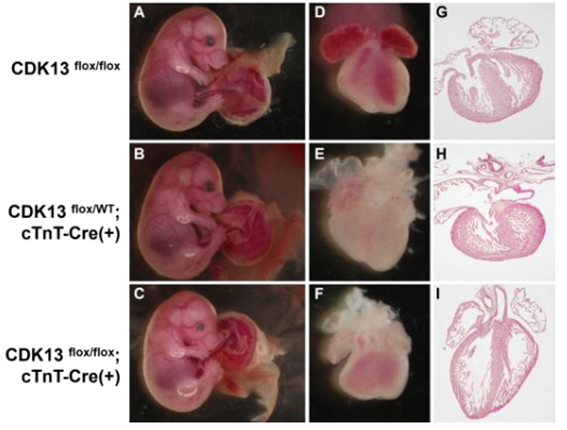Advantages:
- Mutant mouse lines with various CDK13 mutations
- Identified cardiac specific CDK13 mutations which mirror heart defect development
- Genetically modified human induced pluripotent stem cells can be differentiated into different cardiac cell types
- Provides method for screening potential therapeutic agents for congenital heart defects
Summary:
Congenital heart defects (CHDs) are the most common human birth defect, affecting approximately 1% of newborns. Children born with CHDs suffer from varying degrees of cardiac dysfunction throughout their life, with no viable treatment options. Dysmorphic Facial Features, and Intellectual Developmental Disorder (CHDFIDD), a rare form of congenital heart defect, has been linked to heterozygous mutations in the cyclin dependent kinase 13 (CDK13). However, the genetic and molecular mechanisms underlying these developmental defects are not clearly known. This is in part due to a lack of accessible disease models which allow for the study of normal vs dysfunctional cardiac development.
Our researchers have developed novel research tools to study CDK13's role in heart development and congenital heart defects (CHDs). They generated mice with various cardiac specific CDK13 mutations which develop cardiac defects mirroring CHDFIDD, and human induced pluripotent stem cells (iPSCs) with CDK13 mutations, which can be grown into 3D tissue samples. The genetically modified cell lines can potentially be employed as screening tools to evaluate the usefulness of a therapeutic agent for treating CHD, by determining if exposure to the agent can improve or restore CDK13 function.

Cardiac-specific CDK13 mutant mice exhibit defects in heart development. (A-C) E16.5 embryos of WT, Het, and KO. (D-F) Whole hearts from WT, Het, and KO mice. (G-I) Sections through hearts. The compact myocardium of CDK13KO is much thinner (I) than that of WT and Het hearts (G, H).

Characterization of three CDK13 mutant iPSC-CMs: CDK13RR (714/717) has a mutation in subdomain I of the protein kinase, known as the ATP binding region. 2. CDK13Del4 (CDK13-KO) has a mutation that removes exon 4 of CDK13, disrupting the protein in the kinase domain. CDK13RQ (751) is a mutation that occurs in the Arg in the PITAIR751E motif, which likely generates an inactive kinase. (A) Delayed contraction start time in CDK13 mutant iPSC-CMs. (B) Representative flow cytometry showing decrease in cTNT positive cells in CDK13 mutant iPSC-CMs.
Desired Partnerships:
- License
- Sponsored Research
- Co-Development